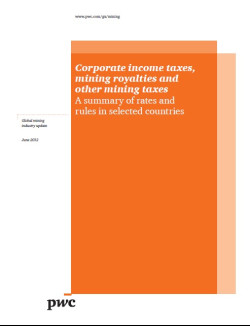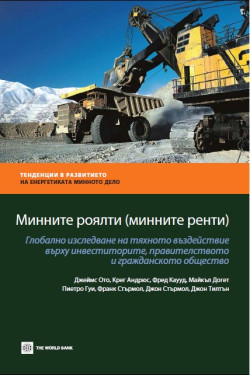Global study of their impact on investors, the Government and civil society.
Edition of the World Bank in Bulgarian language.
Note: the system does not allow for the announcement of the price in Bulgarian Leva, therefore it is announced in euros. It is further declared equivalent price of the book in Bulgarian levas (BGN 1.956 fixings of BNB for 1 euro). The cost of delivery by courier is 7.00 EUR If you decide to buy the book with bank transfer you can do this in BGN. If you decide to buy with a credit/debit card or Paypal, the amount will be debited your account is the equivalent of the price in euro.
Cover Royalties The book examines the history of royalties and their types, which apply at the time in various countries around the world, highlighting the practical problems of administration of taxes, through the allocation of revenue to their reporting.
By analyzing the policies for application of royalties from the perspective of different stakeholders, including Governments, politicians, local communities and other members of civil society, extractive companies and tax administrators, "Mining royalty" identifies the strengths and weaknesses of different approaches to the royalties.
Rated the economic impact of these approaches on production decisions and performance of the mines, as well as the impact of royalties on the investment climate, the civil society and markets.
The section on governance examines the problems associated with the management of revenues from mining activity, received from Governments, including the important issue of transparent reporting them.
Types of royalties imposed worldwide are royalty on the basis of the unit, the base value (ad valorem) based on profit and based on revenue. Most investors prefer systems of taxation, which are based on the last two types of royalties. Based on unit and the value of royalties do not take into account the relative profitability of a mining activity, they just watch the quantity of produced material or value of minerals produced or sold. That's why the first two types of royalties are preferred by Governments.
The majority of African States impose some type of royalty. The two clearly visible exceptions are South Africa and Zimbabwe--Most impose ad valorem royalty and authorise certain expenses to be deducted from the proceeds of sales, in determining the basis for royalties.
All the countries of the Asia and Pacific region, addressed in this document impose some kind of royalty, such as the prevailing forms are based on unit (mainly for industrial minerals) and based on value (ad valorem) royalty.
In Australia most imposed at the level of the province (State) royalties are based on unit or value (ad valorem); only one State, Northern Territory, applies a system based on profit.
Royalty systems in the countries of Latin America are diverse – two of the largest countries-producers of minerals in the region, Chile and Mexico, impose no royalty, as well as some of the provinces in Argentina. Countries imposing royalty, relying heavily on based on value (ad valorem) systems, have a "reasonable" rates, and generally breaking them down to the level of local regions, rather than add them to the central budget.
In North America – most Canadian jurisdictions impose a tax on the mines on the basis of profit or net income. Taxation of mining activity in the United States is very complex, and is often related to the type of ground on which they discovered mineral deposits — federal, State, Indian (reserves), or private land – and with the type of minerals. Commonly used are based on unit and based on value (ad valorem) approaches, although sometimes used and based on profit systems.
With the recommendations at the end of the study, with a detailed examination of the relevant issues and with the applications on compact disc, including examples of existing laws relating to royalty in 40 countries, "Mining royalty" will serve the politicians who made the tax policy, tax officials, who administer the mining sector, researchers and all others interested in the topic practitioners.






































